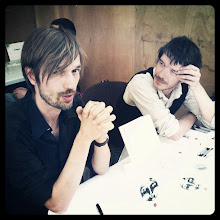
William Wyler's parents were running a shop in Mulhouse. Recalling the beginning of WWI, William said that he regularly spent ‘the night in the cellar until the battle was over’ and then coming out in the morning ‘to see whether we were French or German’. A place where you never know where you are, who you are : this is called fiction. History has been a cinema school for the young Wyler.
Not far from Wyler's parents shop, the café Moll (you see the word over the red & white curtain). During his wealthy business years, my father bought this house. On the first floor, we had rehearsals with my first band. I was playing the bass, a tough instrument for fingers...
An other american figure attached to my city, Gertrude Stein, who spent a few months there (november 1918 - may 1919). She was sent by a NGO (American Found for French Wounded). This is what she says about alsatians in the Autobiography of Alice Toklas : 'We came to know Alsace and the alsatians very well, all kinds of them. They were astonished at the simplicity with which the french army and french soldiers took care of themselves. They had not been accustomed to that in the german army. On the other hand the french soldiers were rather mistrustful of the alsatians who were too anxious to be french and yet were not french. They are not frank, the french soldiers said. And it is quite true. The french whatever else they may be are frank. They are very polite, they are very adroit but sooner or later they always tell you the truth. The alsatians are not adroit, they are not polite and they do not inevitably tell you the truth. Perhaps with renewed contact with the french they will learn these things.'
I'm surprised that Gertrude Stein didn't try to understand the historical circumstances responsible of the Alsatian secrecy.


<< Home